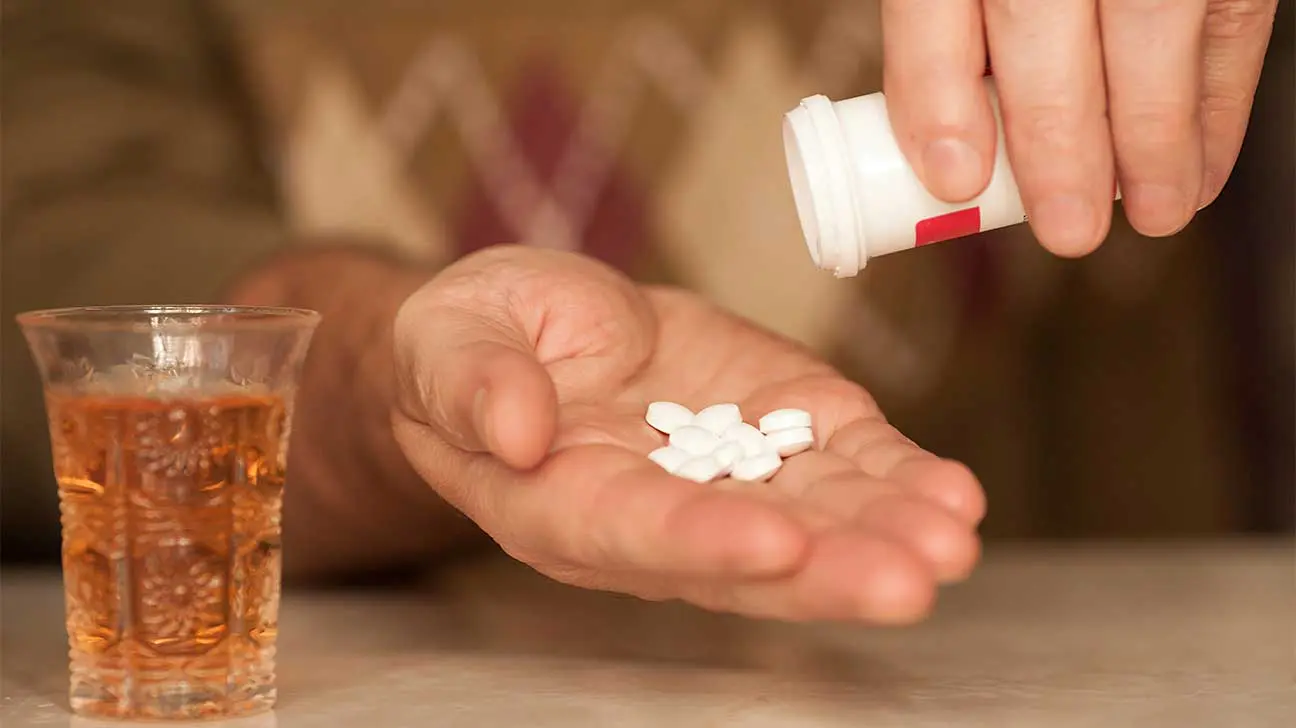
It is common for prescription drugs to contain warnings about use with alcohol. Even when used in moderation, alcohol can interfere with prescribed medication and worsen side effects. Prednisone is one prescription drug that interacts very poorly with alcohol.
As a prescription corticosteroid, prednisone is used as an anti-inflammatory and to treat allergic reactions. Prednisone and prednisolone supplement the adrenal gland’s usual release of cortisol.
It works to alleviate conditions like:
- rheumatoid arthritis
- lupus
- multiple sclerosis
- adrenal conditions
- asthma
- ulcerative colitis
- endocrine conditions
- kidney conditions
- muscle weakness and osteoporosis
In general, corticosteroids like prednisone have wide-ranging side effects on many systems, including gastrointestinal, cardiovascular, endocrine, and immune systems.
More specific side effects of taking prednisone include:
- high blood pressure
- cardiac arrest
- mood changes and depression
- peptic ulcers
- increased risk of infection
- weight gain
- increased insulin requirements/decreased carbohydrate tolerance
- fluid retention (sodium/potassium regulation)
Side Effects Of Mixing Prednisone And Alcohol
On its own, alcohol abuse impacts nearly every major body system. When people use corticosteroids to treat health problems and drink alcohol at the same time, many side effects can occur.
General symptoms and health risks of long-term alcohol use and alcohol abuse may include:
- cardiovascular problems (heart attack, palpitations)
- depression
- suppressed immune system
- anxiety
- high blood pressure and stroke
- liver problems
- depression
- gastrointestinal problems
- increased risk of cancer
Immune System Suppression
When combined, prednisone and alcohol work to suppress the immune system. If you have an existing infection, the prednisone could spread or reactivate it. Prednisone works against the body’s immune response, and drinking alcohol makes your immune system less effective.
For people with lupus, prednisone makes life more bearable. It also makes a cold or flu virus more dangerous and puts them at a higher risk for adverse reactions like pneumonia.
A person with alcohol addiction will be predisposed to other health risks and infections that may only get worse when they take prednisone.
Heavy alcohol consumption can also alter behavior so that a person may intentionally mismanage their own health care in favor of more drinking.
Increased Blood Sugar Levels
On its own, using prednisone and other steroids can cause high blood sugar because of cortisol release. It is also linked to steroid-induced type 2 diabetes. This health condition is marked by the inability of a person’s natural insulin production to regulate blood sugar.
Alcohol use and binge drinking cause a snowball effect with diabetic symptoms. Drinking can destabilize blood sugar levels. When a person already has steroid-induced type 2 diabetes, regular alcohol intake only complicates diabetes symptoms.
Mismanaged diabetes can cause major damage to body systems, notably resulting in blindness and vascular damage (sometimes requiring limb amputation).
Digestive System Issues
Over time, heavy drinking damages the digestive system and liver. Because prednisone use can make the body susceptible to ulcers and infection, a heavy drinker may suffer from stomach ulcers, gastrointestinal bleeding, indigestion, or gastritis (stomach lining inflammation).
Long-term use of prednisone and alcohol only increases the chance of GI irritation, heartburn, and gastrointestinal bleeding.
Safe Alcohol Intake While Using Prednisone
The best medical advice for use of corticosteroids like prednisone indicates no alcohol use. However, moderate or occasional alcohol use while on prednisone is preferable to heavy or binge drinking.
If you will experience severe alcohol withdrawal symptoms, it can be dangerous to stop drinking cold turkey. Drinking should not occur within 24 hours of a prednisone dose. Preferably, there should be more time between drinking and taking corticosteroids.
Health risks associated with steroids and alcohol abuse can be deadly or debilitating in the long term.
Treatment Options For Alcohol Abuse
Alcohol abuse looks different for everybody. Alcoholism can consume your days and ruin your health. Many people are also high-functioning alcoholics.
Alcohol dependency can take its toll on your body and can complicate your personal health management. This is especially true when you mix prednisone or other steroid use with alcohol.
You don’t need to hit rock bottom before seeking help. Is your health being negatively impacted by your drinking? Is a loved one having difficulty managing other health conditions because of alcohol or substance abuse?
If you’re worried about managing withdrawal symptoms or have questions about the recovery process, give our treatment specialists a call to learn about inpatient and outpatient treatment programs for alcohol abuse.
Addiction Resource aims to provide only the most current, accurate information in regards to addiction and addiction treatment, which means we only reference the most credible sources available.
These include peer-reviewed journals, government entities and academic institutions, and leaders in addiction healthcare and advocacy. Learn more about how we safeguard our content by viewing our editorial policy.
- Medscape—Drugs and Diseases, Psychiatry: Alcoholism
https://emedicine.medscape.com/article/285913-overview#a1 - Medscape—Drugs and Diseases, Endocrinology: Alcoholic Ketoacidosis
https://emedicine.medscape.com/article/116820-overview - Medscape—Drugs and Diseases: Prednisone
https://reference.medscape.com/drug/prednisone-intensol-342747 - Mayo Clinic—Drugs and Supplements: Prednisone (Oral Route)
https://www.mayoclinic.org/drugs-supplements/prednisone-oral-route/precautions/drg-20075269?p=1


